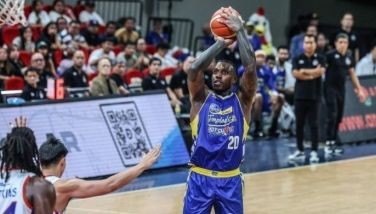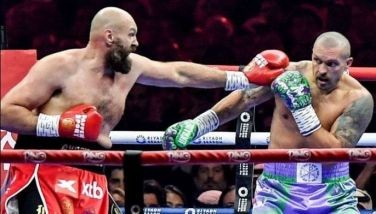Slovenia keen on ‘adopting’ chesser - THE GAME OF MY LIFE by Bill Velasco
April 30, 2001 | 12:00am
I found it greatly distressing to hear early this month that International Master Arianne Caoili was virtually offering her IM status and Filipino citizenship for sale to be able to pursue her sport. It seems that reaching the heights of chess is like being in love: you fight so hard to get it and fight even harder to keep it.
Funding for chess has always been a problem. Just last week, our grandmasters called on Malacañang to alleviate the financial burden besting the organizers of the current Asian Chess Zonals, the qualifier for the World Championships. In the case of Caoili (who is currently out of the country), Slovenia has expressed interest. If you look back through history, the oppressive, restrictive atmosphere of communist countries  particularly the former Soviet Union  forced a majority of the populations of those countries to free their minds with various pursuits instead. Hence the value placed on poetry, literature, and of course, chess. So countries like Slovenia will have the resources to "adopt" a gifted player like Caoili.
This practice is nothing new to international sports, and does not necessarily reflect a lack of nationalism. Zola Budd was a teen middle-distance runner for South Africa in the 1980’s. However, due to her country’s dominant racist policy of apartheid, it was banned from the Olympics. Lo and behold, mere weeks before the 1984 Los Angeles Olympics, Budd had transformed into a British citizen. Unfortunately, during the 3,000-meter run in L.A., she tripped up her idol Mary Decker, destroying both their chances for a gold medal.
Athletes will do whatever it takes to follow their dreams, more so since their lifespan as athletes is quite limited.
In 1938, Sgt. Karolyi Takacs of the Hungarian Army was one of the finest rapid fire pistol shooters in the world, a cinch to dominate the coming 1940 Olympics to be held in Tokyo. But a freak accident during military maneuvers almost ended his dream. A defective pin exploded a hand grenade in Takacs’ right hand before he could throw it, blowing the limb off.
Takacs never gave up. He practiced alone, with his left hand, and nobody knew. The following year, he attended Hungary’s national championships. All the shooters approached him to express their sympathy and thank him for coming to watch.
"I told them ‘I didn’t come to watch you, I came to compete.’ They were even more surprised when I won," Takacs recalled.
Despite the cancellation of the 1940 and 1944 Olympics due to World War II, Takacs held on, winning gold in London in 1948 and Helsinki in 1952. Talk about unsinkable.
When Bea Lucero was denied a chance to compete in the Seoul Olympics in 1988 due to internal politics within the Gymnastics Association of the Philippines, she knew her chances of competing for an Olympic medal in her sport were miniscule. So she turned to taekwondo. Four years later in Barcelona, she accomplished her dream of an Olympic medal.
The Philippine ice skating team, composed of ShoeMart skaters, has brought home tons of gold medals from international competitions. Yet it was only recently that they started receiving substantial assistance from the Philippine Sports Commission. But, given the limitations placed on the PSC by Congress, that will not be enough. They fly to the world championships in Ohio next month, trying to pay their own airfare, as usual.
On the other side of the coin, two of China’s most talented basketball players must feel like chips in a global game of poker. Last week’s issue of Newsweek chronicles how Wang Zhizhi, now a Dallas Maverick, is considered a public relations tool for his country’s Olympic bid. Yao Ming, taller and younger, is being held back. Authorities apparently are trying to devise a means to milk him for life once he is released to the NBA draft next season.
Would you make a deal with the devil to follow your dream? Let’s not condemn our athletes who have to sell their souls to follow their calling. Their passions are enviable.
Funding for chess has always been a problem. Just last week, our grandmasters called on Malacañang to alleviate the financial burden besting the organizers of the current Asian Chess Zonals, the qualifier for the World Championships. In the case of Caoili (who is currently out of the country), Slovenia has expressed interest. If you look back through history, the oppressive, restrictive atmosphere of communist countries  particularly the former Soviet Union  forced a majority of the populations of those countries to free their minds with various pursuits instead. Hence the value placed on poetry, literature, and of course, chess. So countries like Slovenia will have the resources to "adopt" a gifted player like Caoili.
This practice is nothing new to international sports, and does not necessarily reflect a lack of nationalism. Zola Budd was a teen middle-distance runner for South Africa in the 1980’s. However, due to her country’s dominant racist policy of apartheid, it was banned from the Olympics. Lo and behold, mere weeks before the 1984 Los Angeles Olympics, Budd had transformed into a British citizen. Unfortunately, during the 3,000-meter run in L.A., she tripped up her idol Mary Decker, destroying both their chances for a gold medal.
Athletes will do whatever it takes to follow their dreams, more so since their lifespan as athletes is quite limited.
In 1938, Sgt. Karolyi Takacs of the Hungarian Army was one of the finest rapid fire pistol shooters in the world, a cinch to dominate the coming 1940 Olympics to be held in Tokyo. But a freak accident during military maneuvers almost ended his dream. A defective pin exploded a hand grenade in Takacs’ right hand before he could throw it, blowing the limb off.
Takacs never gave up. He practiced alone, with his left hand, and nobody knew. The following year, he attended Hungary’s national championships. All the shooters approached him to express their sympathy and thank him for coming to watch.
"I told them ‘I didn’t come to watch you, I came to compete.’ They were even more surprised when I won," Takacs recalled.
Despite the cancellation of the 1940 and 1944 Olympics due to World War II, Takacs held on, winning gold in London in 1948 and Helsinki in 1952. Talk about unsinkable.
When Bea Lucero was denied a chance to compete in the Seoul Olympics in 1988 due to internal politics within the Gymnastics Association of the Philippines, she knew her chances of competing for an Olympic medal in her sport were miniscule. So she turned to taekwondo. Four years later in Barcelona, she accomplished her dream of an Olympic medal.
The Philippine ice skating team, composed of ShoeMart skaters, has brought home tons of gold medals from international competitions. Yet it was only recently that they started receiving substantial assistance from the Philippine Sports Commission. But, given the limitations placed on the PSC by Congress, that will not be enough. They fly to the world championships in Ohio next month, trying to pay their own airfare, as usual.
On the other side of the coin, two of China’s most talented basketball players must feel like chips in a global game of poker. Last week’s issue of Newsweek chronicles how Wang Zhizhi, now a Dallas Maverick, is considered a public relations tool for his country’s Olympic bid. Yao Ming, taller and younger, is being held back. Authorities apparently are trying to devise a means to milk him for life once he is released to the NBA draft next season.
Would you make a deal with the devil to follow your dream? Let’s not condemn our athletes who have to sell their souls to follow their calling. Their passions are enviable.
BrandSpace Articles
<
>
- Latest
- Trending
Trending
Latest
Trending
Latest
Recommended































